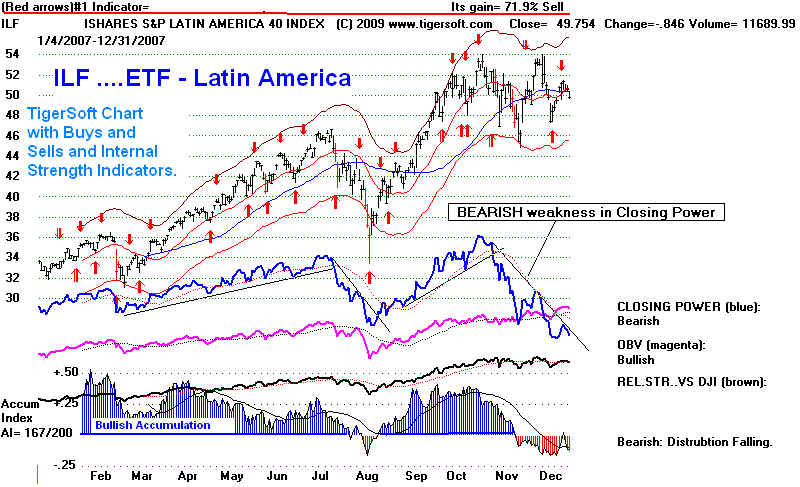|
Lessons from Argentina
Currency Collapse of 2002
   
You
know a country has problems when its main publicly
traded phone
company drops from 50 to 2 in two and a half
years. That was the case in Argentine. That stock's direction
matched
the US markets. But the size of the decline was
an Argentine
nightmare. Its nearly total collapse occurred
because of the
2002 collapse of the Argentine Peso.
Argentine Telephone Stock in ADRs

2002 Collapse of Argentine Peso.
The chart below shows how fast the Peso lost its value.
When it was suddenly de-coupled
from the Dollar, it fell 75% in 6 months. The decline was rapid, but not immediate.
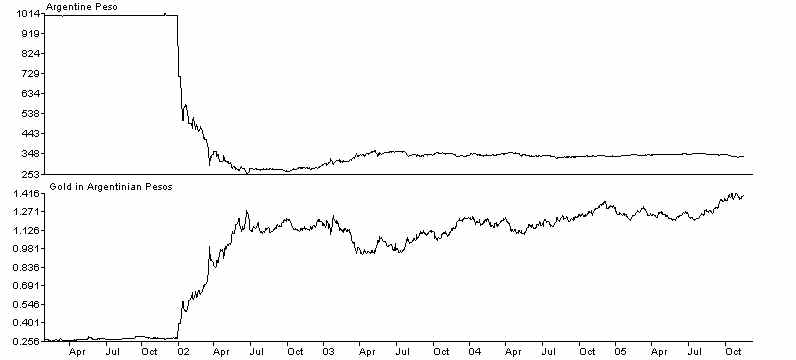
What
Caused The Peso's Collapse in the First Half of 2002?
A brutal military dictatorship ruled Argenina from1976 to 1983. Thirty
thousand simply
disappeared.
Many were tortured and pushed out of air planes. There were no trials.
The dictatorship
ran up huge debts in failed projects and the Falkland/Malvinas
Islands War. (Compare this with George
Bush's absurdly arrogant war on Iraq, which
economists say will cost the US $3 trillion.)
Unemployment and international isolation ended the distatorship and there was an election
in 1983.
The new government tried to restore the
Argentine economy by creating a new currency. New state loans
were required on which in six years the government
defaulted. In 1989, Argentina's inflation reached 200%
per month, topping 3,000% annually. A
new government came in, campaigning on a populist platform,
then privatized the telephone, energy and water
services. With the new proceeds, the government started to
restore confidence in Argentina's currency and
economy. IMF loans were procured. The new Peso had a
monetary value fixed by the value of the US Dollar.
Life got immediately better for those with property and
good jobs. They could travel abroad, import
household appliances and computers. But Argentina's own exports
suffered and recession became endemic. To pay
its quickly rising debts, Argentina had to keep borrowing
more money from the IMF, it had nothing more to sell
off, so it delayed its repayments. In 1999, Argentina's
GDP dropped 4%. Exporters wanted a devaluation.
But Argentine banking experts argued against a controlled
devaluation, in which the Peso would be de-linked
from the Dollar. Devaluation was painted as unpatriotic.
So, the government did nothing while the recession
turned into a depression as the 2001 world-wide recession hit.
With government funds being exhausted and the
countries balance of trade worsening, wealthy Argentines converted
their money to Dollars and took it out of the country
for safety, This encouraged a "run on the Banks".
"The
official unemployment rate approached 20 percent and more than 40 percent
of the population lived under the poverty line. This
evolving economic apocalypse frightened
the wealthy elite who began to send their
peso/dollars abroad for safekeeping. This emptied
the Argentine Central Bank coffers of foreign
reserves which were heretofore used to amortize
the nation's humongous foreign debt of US$141 billion
(the greatest per capita foreign debt in
the world with the exception of the US.)" ( http://www.gold-eagle.com/gold_digest_03/vronsky062303.html
)
In 2001, people fearing the worst began withdrawing large sums of money from their bank
accounts, turning pesos into dollars and sending them
abroad, causing a run on the banks. The government then
enacted a set of measures that froze all bank
accounts for twelve months, allowing for only minor sums of cash
to be withdrawn. Many Argentines became enraged and
took to the streets of important cities, especially Buenos
Aires in 2001 to 2002. At first. there were simply noisy
demonstrations, but soon they included property destruction,
often directed at banks, foreign privatized companies, and
especially big American companies. Foreign capital
stayed away and .matters worsened.
Confrontations between the police and citizens became a common sight,
and fires were also set on Buenos Aires avenues. A State of
Emergency was declared, but this produced violent
protests in December 2001 in which several died.
The President fled in a hellicopter and residned, creating a
a political vacuum. An interim goverment emerged from
the Legislative Assembly. It defaulted on the larger
part of the public debt, $93 BILLION at the end of 2001
A new President, Eduardo Duhalde, was appointed
by the Legislative Assembly. Announcing "we are
in collapse" and "Argentina is bankrupt", he abandoned the
1-1 peso dollar parity in favor of a provisional 1:4 pesos
per dollar. All Dollar accounts were converted by law
to Pesos at this rate! It defaulted on $143 billion
in debt.
"After a few months, the exchange rate was left to float more or less freely. The
peso suffered a huge
depreciation, which in turn prompted inflation (since
Argentina depended heavily on imports, and had no means
to replace them locally at the time). The economic
situation became steadily worse with regards to inflation and
unemployment during 2002. By that time the original 1-to-1
rate had skyrocketed to nearly 4 pesos per dollar,
while the accumulated inflation since the devaluation was
about 80%. (It should be noted that these figures were
considerably lower than those foretold by most orthodox
economists at the time.) The quality of life of the average
Argentinian was lowered proportionally; many businesses
closed or went bankrupt, many imported products became
virtually inaccessible, and salaries were left as they were
before the crisis."
ARGENTINE RECOVERY SHOCKS THOSE WHO SAID
A COUNTRY
CAN NOT SIMPLY WALK AWAY FROM ITS INTERNATIONAL DEBTS
A year later, the economic outlook began to improve dramatically. Unlike in the
1990's, the cheaper price
for the Peso encouraged exports and tourism. The Peso
slowly revalued on its own. The trade surplus became
very large. While imports started to rise as citizens
began to prosper, foreign capital came into Argentina
worked to counter that force and strengthen the Peso.
GNP surged 8.8% in 2004, 9.0% in 2005, 9.1%
in 2005 and 8.5% in 2006. Nine million people in
Argentina still live below the poverty line, but that's half
the number who suffered so five years ago.
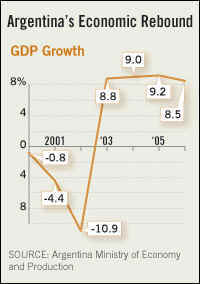
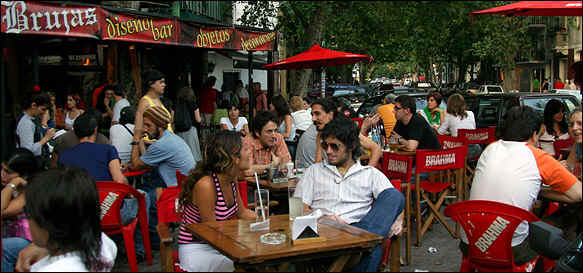
Trendy Argetine restaurants...Elegant hotels... Smartly dressed guests....Harp concertos.
Busy outdoor markets on a sun-drenched. Flourishing tourism...
.
Argentina's Lessons for the US.
(1) A war is a great drain on
national resources. The occupation of Iraq puts the US at grave financial risk.
Three trillions dollars will have been wasted by Bush and
Cheney's blunder. We may never recover.
TigerSoft Bog -
3/7/2008 -The Real Cost of Bush and Cheney's Iraq ...
(2) Until the US can start to export much more, its
currency will be under steady pressure. Since this
article was written, a world-wide financial panic has hit.
This has made the Dollar and US Treasury
instruments seem to be havens for investors who have nowhere else
to turn. When, however, the
world-wide recession ends or China chooses to no longer provide
the US any more loans, the Dollar
will likely come down very hard, putting the US at risk of
discovering first-hand what Argentina has learned.
(3) The stronger Dollar since the fall of Crude oil in the Summer
of 2008, has made it even harder
to export American manufactured goods and allowed foreign
products to continue to dominatethe
shelves of American stores. This only makes the Dollar more
vulnerable longer term and brings
the US closer to the Argentine case.
(3) The world wide recession may very well dry up foreign
loans that keep an insolvent government afloat.
That is what happened to Argentina in 2001 and triggered
the collapse of its currency. Watch for signs
that China changes its policy of buying US Treasuries or an
OPEC decision to use currencies other
than the Dollar as the primary medium of international
exchange for buying its oil.
(4)The world wide bull market from 2003-2007 had been
leaving most of the US behind. The rising
foreign markets had the effect of creating a flight
from the dollar among American investors. Now,
the break in the bubble is making investors consider the
Dollar a safe place to put their money.
5) But US financial institutions, because of their reckless
use of leverage, are now in 2009, essentially
insolvent. So, they are no longer in a posiiton to
benefit from a strong Dollar. This will dramatically
hurt the long term trade imbalance of the US.
American banks are widely distrusted and despised, by
Americans and foreigners alike, as trillions of Dollars
must be raised by the Treasury and the Federal
Reserve to keep these Zombie Banks alive. This short-term
borrowing makes the US Goverment that
much more debt-ridden and financially vulnerable. The
grotesqueness of the bailouts for banks reveals
as never before how beholden both major political parties in the
US are to Wall Street.
(5) If the US follows the
Argentine model, its government will be tempted to sell off its finest assets in
sweetheart deals which they will term
"privatization". This has not happened yet, But as Obama
moves towards puting the US Government into a
position of owing $2 trillion, we may even see the
National Parks be privatized. Selling rights to
pollute to coal-burning US utilities is a sign of the times.
(6) More important, is what is happening to corporate
America. The 2008-2009 market massacre
is allowing China, and any foreign investor that wishes, to
buy corporate America for pennies on the
Dollar. When there is a recovery, profits will not
stay in this country. They will go overseas, if
the Argentine model plays out.
(7) The IMF bailed Argentina out, again
and again. "Like a gambling house that keeps handing out
chips to a losing player to keep him in the game, to clean
him out, the IMF kept shoveling dollars
into Argentina, until she had lost everything she
had." When their stock market was down to "give away"
levels, the banks and brokerages that control the IMF
bought Argentine stocks. In that way, the
backers of the IMF can lose billions in loans and still
make money.
http://64.233.167.104/search?q=cache:Q-i2wWDU_BQJ:www.worldnetdaily.com/news/article.asp%3FARTICLE_ID%3D25862+Argenitna+IMF+debacle%22&hl=en&ct=clnk&cd=1&gl=us&client=firefox-a
China and the
"friendly" OPEC countries are now doing this to the United States. But we
are not
being warned by our government, whose short term interests
are served by more borrowing.
(7) Government efforts to forbid the drain of currency can
create violent protests. If Obama raises
taxes too swiftly on the richest Americans, we can expect their
capital to go to overseas tax havens.
Already, the rich are wailing that Obama is a secret Marxist and
has started a "class war" against
the rich.
(8) At some point, when Americans wake up and find that
they are owned by foreigners, they will
turn nativist and kick and scream. But it will be too
late and poverty will become very widespread
because the collapse of a currency creates its own dynamics
and the decline starts to feed on itself:
At this point, nothing can stop its collapse.
Example: Fear of a currency collapse ---> flight of capital ---> unemployment
---->riots
-----> more fear and more flight of capital. The cycle only ends with a financial
panic and devaluation.
(9) A sudden and severe drop in a currency dishes up stark
changes in business and personal
consumption, as vital imports cannot be afforded and
businesses needing them fail. This sends
poverty and unrest to very dangerous levels. Such is
the experience of Argentina in 2002-2003.
10) At the same time, a very
over-priced currency soon generates recession and rapid increase
in impoverishment, too. Review Argenitina between
1997 and 2001. This is because the IMF will only
grant its loans (bailouts) on conditions that the
Government lay off many of its own workers and make
deep across-the-board cuts in its spending and and social
safety-net programs.
----- See World Bank's detailed study of this:
http://www-wds.worldbank.org/external/default/WDSContentServer/IW3P/IB/2003/07/22/000094946_03070904012091/Rendered/INDEX/multi0page.txt
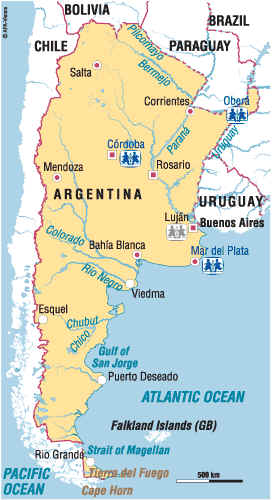
The International Monetary Fund:
A Critical View by Pat Buchanan
: December 29, 2001
"The beneficiaries of IMF bailouts are the First World
speculators and plungers who find their emerging market
paper going rotten, but can access the Treasury and
Fed to get the IMF to bail out their clients, so they can get
their money out, while ours pours in. A second
beneficiary is the overpaid IMF employees with tax-free
salaries, who travel the world first-class as they
play savior of troubled nations. With the hook of our dollars,
they acquire real power by making the recipient
nations debtors, clients and captives of that rising New World
Order in which the IMF is to play a commanding role.
Bottom line: The IMF is the social safety net of
Goldman
Sachs. It exists to spare the Money Power the
free-market consequences of its idiot investments. Argentina's
is the greatest default in history – not the
last. More are coming. For all that keeps this game going is a U.S. trade
deficit of $450 billion and IMF and World Bank loans
that shovel tens of billions of dollars abroad annually to
stave off defaults. ( http://www.worldnetdaily.com/news/article.asp?ARTICLE_ID=25862
)
Economic Debacle in Argentina
|
The IMF Strikes Again
by Arthur Macewan
Dollars and Sense magazine, March / April 2002
As Argentina entered into the lasting downturn of the period since 1998, the IMF
continued, unwavering,
in its financial support. The IMF provided "small" loans, such as $3 billion in
early 1998 when the country's
economic difficulties began to appear. As the crisis deepened, the IMF increased its
support, supplying a
loan of $13.7 billion and arranging $26 billion more from other sources at the I end of
2000. As conditions
worsened further in 2001, the IMF pledged another $8 billion.
However, the IMF coupled its largesse with the condition that the Argentine government
maintain its
severe monetary policy and continue to tighten its fiscal policy by eliminating its budget
deficit.
(The IMF considers deficit reduction to be the key to macroeconomic stability and, in
turn, the key to
economic growth.)
The Argentine government undertook deficit reduction with a vengeance. With the
economy in a
nosedive and tax revenues plummeting, the only way to balance the budget was to
drastically cut
government spending. In early July 2001, just before making a major government bond
offering,
Argentine officials announced budget cuts totaling $1.6 billion (about 3% of the federal
budget),
which they hoped would reassure investors and allow interest rates to fall. Apparently,
however,
investors saw the cuts as another sign of worsening crisis, and the bonds could only be
sold at high
interest rates (14%, as compared to 9% on similar bonds sold just a few weeks before the
announcement
of budget cuts). By December, the effort to balance the budget required cuts that were far
more severe;
the government announced a drastic reduction of $9.2 billion in spending, or about 18% of
its entire budget.
http://www.itulip.com/forums/showthread.php?t=507
http://64.233.167.104/search?q=cache:qWYUHAQlwzsJ:www.zonalatina.com/Zldata208.htm+argentina+2001+currency+chart&hl=en&ct=clnk&cd=30&gl=us&client=firefox-a
===================================================================================
2008-2009 ILF - ETF
for Latin America
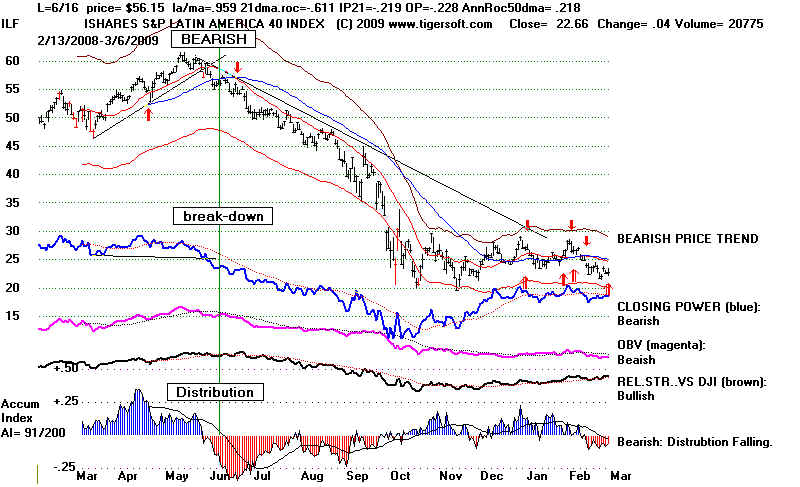
|

